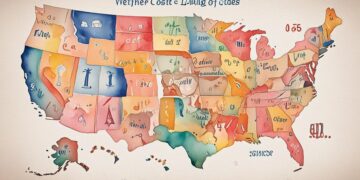The impact of inflation on the personal finances of Americans

The Hidden Impact of Inflation on Daily Living
Inflation acts as an unseen force reshaping financial landscapes, compelling Americans to reconsider how they allocate their hard-earned money. As prices for a range of goods and services skyrocket, individuals and families experience the strain on their budgets in palpable ways. For many, the elevated cost of living pushes personal finances to a tipping point, necessitating a reevaluation of spending habits and savings strategies.
Key Areas Impacted by Rising Costs
Several crucial sectors feel the brunt of inflation, fundamentally altering how people manage their daily expenses. Notably:
- Grocery Prices: The price of staple items like bread, milk, and eggs has surged, with some reports estimating grocery bills have increased by nearly 13% over the past year. Shoppers may find themselves trading down brands or seeking out sales more vigorously than before, reshaping their culinary habits.
- Housing Costs: The real estate market has seen unprecedented growth, with home prices reaching heights few could have anticipated. Renters face rising monthly payments that erode their disposable income, while potential homebuyers struggle to enter a market where bidding wars have become commonplace.
- Transportation Expenses: As gas prices fluctuate, commuters are forced to rethink their travel strategies. Rising costs at the pump can lead individuals to carpool or utilize public transportation options, which not only provides cost-saving opportunities but also encourages a shift towards sustainable practices.
The Consequences of This Financial Pressure
The implications of inflation stretch beyond mere numbers on a receipt. As household budgets increasingly feel the pinch, families may find themselves prioritizing needs over wants, often postponing vacations or delaying major purchases such as new vehicles or home renovations.
Moreover, savings goals can seem increasingly out of reach. When expenses outpace income growth, setting aside money for emergencies or retirement may be more challenging than ever. Financial investments that once promised growth could yield lower returns in a high-inflation environment, forcing individuals to consider alternative investment vehicles or strategies.
Strategies for Managing Finances Amid Inflation
To navigate this daunting economic landscape, it is vital for consumers to explore diverse strategies for financial management. Some approaches include:
- Diversifying Investments: Individuals should consider spreading their investments across various asset classes to mitigate risks associated with inflation. Options like commodities or real estate can offer potential protection against price increases.
- Adjusting Budgets: A thorough review of monthly expenditures can help identify non-essential spending that can be cut or reduced. Tracking expenses through apps or budgeting software can provide clarity in managing finances.
- Seeking Alternative Income Sources: Many individuals are exploring side gigs or passive income opportunities to bolster their earnings. This extra income can help ease the financial burden created by inflation.
By gaining insight into the current financial landscape and adapting to the realities of inflation, Americans can empower themselves to make informed decisions. Ultimately, transforming challenges into actionable financial knowledge can lead to a more secure financial future. Understanding how inflation operates and its effects on personal finances is not just essential; it is a critical step towards fostering resilience in an ever-changing economic climate.
Understanding How Inflation Reshapes Spending Power
Inflation’s relentless rise has created a noticeable ripple effect throughout the personal finances of Americans, prompting changes as households struggle to keep their budgets in line with increasing costs. The perception of money’s value is shifting, with many feeling that their purchasing power diminishes as everyday essentials become more expensive. As a result, maintaining a comfortable lifestyle is becoming an arduous task for many families across the nation.
Inflation and Its Effect on Consumer Behavior
Behavioral changes due to inflation are not just anecdotal; they are supported by data that reveal how spending habits adapt to economic pressure. Primary areas of concern include:
- Luxury vs. Necessity: As the cost of living rises, households are increasingly inclined to differentiate between necessary purchases and discretionary spending. Reports indicate that sales for luxury items have dipped as families tighten their belts, opting instead for essential goods and services.
- Brand Loyalty: Inflation has prompted many consumers to reassess brand loyalty. Shoppers may trade recognizable brands for generic or store brands that offer similar quality at a lower price point. Such shifts can disrupt long-standing consumer habits, influencing even the most loyal customers to seek value over prestige.
- Dining Out Trends: The restaurant industry has also felt the pinch, with many diners choosing to cook at home rather than dine out. This change is backed by a survey revealing that nearly 70% of Americans have reduced their frequency of eating at restaurants, illustrating a clear shift in spending priorities.
The Broader Economic Implications on Households
Beyond immediate adjustments in shopping habits, inflation carries broader implications for American households. The rising costs can strain family budgets, leading to increased financial anxiety and stress. Some significant consequences include:
Increased reliance on credit cards: With households facing the dilemma of high costs versus stagnant wages, many Americans have turned to credit cards to bridge the gap. This growing reliance can result in higher debt levels that may hinder long-term financial stability.
Impact on financial planning: Families may find it increasingly challenging to adhere to their financial plans as inflation affects not just day-to-day expenses but also long-term goals. Estranged from retirement savings and college funds, many parents may feel compelled to dip into reserves to cover essential expenses.
Adapting in a Changing Economic Climate
Recognizing the impact of inflation invites individuals to become proactive in managing their personal finances. Adapting to and anticipating the changes in price dynamics is crucial. Some strategies include:
- Reevaluating Financial Goals: It may be time to revisit financial targets based on current economic conditions, taking into account the shifting landscape of income and expenses.
- Educating About Inflation Trends: Staying informed about economic indicators, such as the Consumer Price Index (CPI), can provide valuable insights into future price changes, enabling better financial decisions.
- Engaging Financial Advisors: Consulting with financial advisors can help tailor investment strategies to mitigate inflation’s impact, ensuring that assets grow at a pace that exceeds inflation rates.
In an increasingly inflationary environment, Americans are not simply passive observers but active participants in shaping their financial destinies. By adapting to the demands of a fluctuating economy, individuals can better equip themselves to navigate the challenges ahead, ultimately emerging resilient in their financial journeys.
Rising Costs and Their Consequences on Savings and Investments
As inflation continues to spike, its tentacles reach far beyond just immediate spending habits, penetrating deeper into the fabric of personal savings and investment strategies among Americans. The motif of financial security is threatened, forcing individuals to rethink their approaches to wealth accumulation and preservation.
The Erosion of Savings
The tangible impact of inflation also manifests in the struggle to maintain and grow savings. As prices rise, the purchasing power of the dollar decreases, compelling Americans to reconsider the effectiveness of their savings plans. With the current inflation rate hovering around levels not seen in decades, the value of cash reserves is gradually diminished. For many, the traditional savings account—which typically offers negligible interest rates—becomes an increasingly ineffective vehicle for preserving wealth. According to a recent report by the Federal Reserve, more than 60% of savings accounts are yielding returns well below the inflation rate.
- Frequent Bank Account Adjustments: To combat this erosion, many Americans are migrating toward high-yield savings accounts and Certificate of Deposits (CDs) with better rates, specifically designed to keep pace with inflation. However, these options often come with increased restrictions and penalties for early withdrawals, forcing savers to lock their funds for extended periods.
Investment Strategies Under Pressure
With inflation at the forefront, investors are reassessing their portfolios to safeguard their assets. The inclination to shift investments into sectors seen as inflation-resistant is growing. For instance:
- Real Assets: Many are turning to real estate or commodities, which tend to retain value when inflation nibbles at cash holdings. A survey by the National Association of Realtors suggests that 48% of prospective home buyers are influenced by rising prices, making real estate a viable asset in many households’ financial strategies.
- Stock Market Anxiety: The stock market presents a dual-edged sword, as certain sectors thrive in inflationary environments while others flounder. Investors are urged to diversify into sectors like utilities, energy, and consumer staples, which often fare better during economic downturns. Nonetheless, navigating the volatility brought on by inflation creates layer upon layer of anxiety for households relying on the market for retirement savings.
Retirement Dreams at Risk
As inflation mounts, the reality of retiring comfortably becomes more precarious for many Americans. Rising costs pose significant risks to retirement plans, forcing many individuals to reconsider their retirement readiness and future spending capabilities. A recent study from the Employee Benefit Research Institute found that nearly 60% of workers are unprepared for retirement, largely due to escalating living expenses.
Many families find themselves re-evaluating their projected retirement ages, often stalling their transition into retirement to allow for additional savings time. As inflation pressures mount, proactive planning becomes vital; couples are increasingly turning to financial advisors to help tailor investment strategies and navigate the turbulent waters of pre-retirement financial management.
In an era marked by financial unpredictability, understanding the influence of inflation can empower individuals to adapt their savings and investment strategies accordingly. This dynamic landscape warrants ongoing reevaluation and adjustment, promoting resilience in the face of an ever-evolving economy.
Navigating the Financial Landscape Amid Inflation
The implications of inflation on the personal finances of Americans are profound and multifaceted. As households grapple with the tangible effects of rising prices, it is evident that strategic financial planning has never been more critical. The erosion of savings and the necessity to reassess investment strategies highlight the urgency for individuals to adapt to a shifting economic environment. With more than 60% of savings accounts offering returns below inflation rates, traditional approaches to wealth preservation are increasingly called into question.
Moreover, the importance of diversifying investment portfolios cannot be overstated. Shifting assets into inflation-resistant sectors, such as real estate and commodities, may offer stability in uncertain times. Families striving for a secure retirement must also recalibrate their expectations and prepare for potential longer periods of workforce participation. This reality underscores a pressing need for financial education and guidance.
As inflation threatens to hamper financial goals, consumers are encouraged to remain vigilant and proactive. Financial advisors can play a crucial role in helping individuals craft tailored strategies that mitigate risks associated with inflation and bolster long-term resilience. Opportunities exist for those willing to reevaluate their financial landscape and pursue options that align with their goals.
In summary, understanding the full impact of inflation on personal finances is essential for navigating today’s economy. As Americans embark on this journey, they will find that informed decision-making and adaptability are key elements in safeguarding their financial future in the face of fluctuating economic conditions.

James Carter is a financial writer and consultant with expertise in economics, personal finance, and investment strategies. With years of experience helping individuals and businesses navigate complex financial decisions, James provides practical insights and analysis. His goal is to empower readers with the knowledge they need to achieve financial success.





